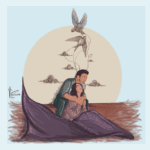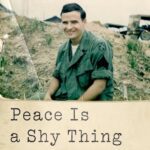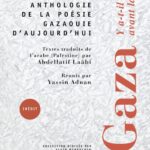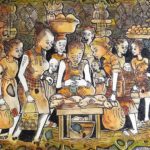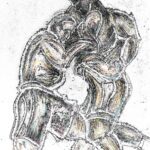How We Drink Coffee When It Rains War
We weren’t expecting it to rain, not when you can still see blue sky. It comes in one moment—an eye blink—a sip of coffee. Like war.
It will be over in a minute, says the old, Moroccan man whose grandfather had once owned a pickle and cheese deli in this space. And I find myself praying, let this war end in the blink of an eye, in a bite of cheese sandwich.
But I can hear the sound of bullets. The crossing of an inch into what’s not yours. I am praying for a ceasefire, a return to acknowledging truth. But this is the thing with truth. It can be bent into the heavy plated steel of a tank gun. It can be pronounced in the highest, spiritual, moral tone—in a speech—broadcasted to the world: God created us all in the same image—those across the border bear my image—and hence are on my land. And thus, the morality of evil is born. The blood of my brother is mine.
What does it mean when the world listens to broadcasts—to the speech, to the bullets, to the blood? How silent spilt blood flows in the world’s silence. How it screams in the world’s screams.
And in the world’s blood I hear my silence. My scream is stuck in my throat like a steel boulder that bullets are carved from. There is not enough morning coffee to wash it down.
I need to check how everyone else can enjoy their coffee when it washes nothing down.
What do you think of Kiev being bombed?
One friend says: They can bomb the shit out of the Ukraine. I hate them. I hate that they carried out the dirty work for the Nazis. They had nothing to gain for themselves. Just because they hate Jews. You know they still hate Jews.
She is the third generation of Holocaust survivors. The reason wars should not be fought. They cannot be forgotten.
My boulder grows bigger, metallic bitter in my throat. I had seen the photos of a big room of small, Ukrainian Jewish orphans in Odessa, bunkering down. There are three such orphanages of two hundred and fifty children, run by a Chabad rabbi who is now seeking to save them, away from the Russian border. I know the man who has raised money and awareness over the years to sustain these children. I know their stories. The story. We all suffer under bombings and bullets. There is no space for love or hate in war.
I turn to the old man for his old-world wisdom. He knows what it is to be displaced as a child from Morocco, and escape as a Jew to Israel. He says, he is waiting for America to fall. They don’t care about anyone. I don’t understand, how can they not care?
I don’t want him to be correct. I want us to care. Everywhere. But how do you care without bullets in return. How can we stop bullets with a prayer, with a broken piece of bread?
I disturb a young geologist, a doctoral candidate in the midst of eating a cheese sandwich. I want to know the wisdom of oxidized iron traces in stone. These days, he says, you can’t just invade and take a country. Putin didn’t realize it wouldn’t be easy. There are social media sites, there are protests, he didn’t realize not all the Russians would support war. And then the young geologist said what I felt, But what do I know?
It’s still raining, but there is an airplane length of blue sky in view. There is so much the sky can hold—all our unseen stars, darkness, the three-quarter moon. How it all fades in the rising sun, as it peeks between the rising smoke, the grey clouds—as if checking, like many Ukrainian citizens this morning, if it’s safe to emerge.
Sarah Sassoon
Sarah is a writer and poet of Iraqi-Jewish descent. Her work has appeared or is forthcoming in Michigan Quarterly Review, Lilith, The Ilanot Review, The Roadrunner Review and elsewhere. She is the recipient of the Andrea Moriah Poetry prize, and a runner-up for the Anna Davidson Rosenberg Poetry Award. Her first children’s picture book, Shoham’s Bangle is forthcoming with Kar-Ben Publishing in 2022.

